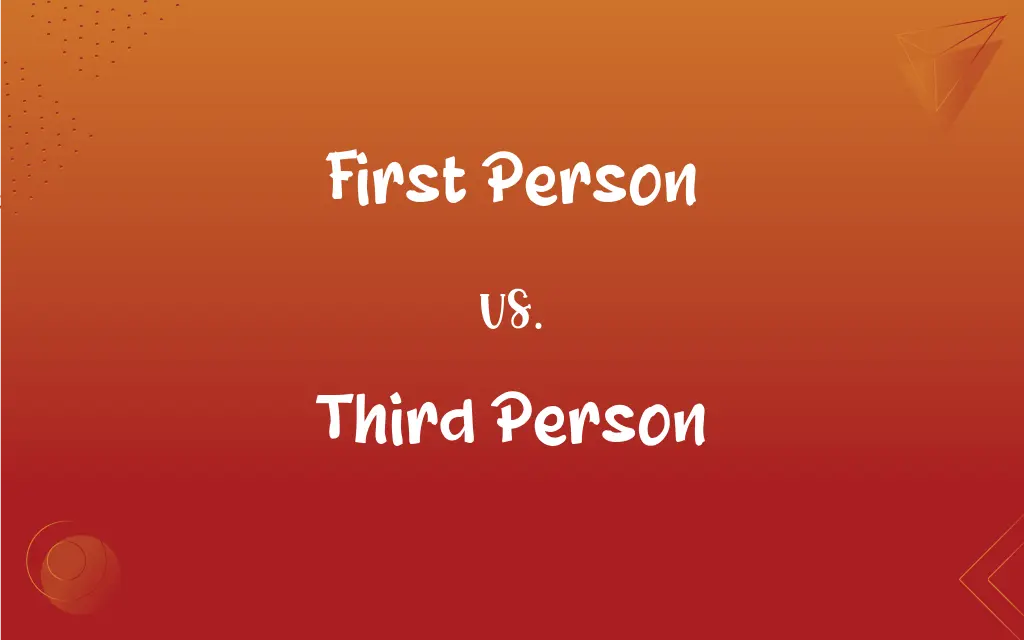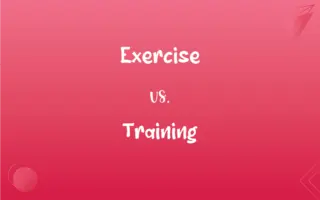First Person vs. Third Person: What's the Difference?
Edited by Aimie Carlson || By Harlon Moss || Published on November 12, 2023
First person uses "I" or "we" to narrate, centering the speaker's perspective. Third person employs "he," "she," "it," or "they," focusing on outside characters.

Key Differences
First person narrative provides the viewpoint of the speaker or protagonist, typically using pronouns like "I" or "we." This perspective offers a direct insight into the narrator's thoughts, feelings, and experiences. On the contrary, third person narrative offers an external viewpoint, using pronouns such as "he," "she," "it," or "they." This perspective often provides a broader scope, detailing characters' actions and emotions from an outsider's standpoint.
In first person writing, readers experience the story through the narrator's eyes. This direct connection can make stories more intimate and personal, allowing readers to deeply resonate with the narrator's emotions. In contrast, third person offers a more detached viewpoint, providing the opportunity to explore multiple characters' thoughts and motivations, often in a more objective manner.
The choice between first person and third person impacts the storytelling approach. While the former immerses readers into a singular perspective, making them privy to the protagonist's internal world, the latter offers a wider lens, capturing the dynamics among various characters. This choice affects how readers perceive the narrative, its events, and the characters involved.
First person narratives often give readers the feeling of being "in the shoes" of the protagonist, fostering a close bond with the character. This can make the narrative more immediate and relatable. Conversely, third person allows for a more comprehensive view of the story's world, presenting different characters' viewpoints, thereby giving a fuller picture of the narrative's events.
Utilizing first person or third person depends on the writer's intent and the story's needs. The former offers depth, drawing readers into the protagonist's mind, while the latter provides breadth, presenting a multifaceted view of the story's world.
ADVERTISEMENT
Comparison Chart
Pronouns Used
"I", "we"
"he", "she", "it", "they"
Narrative Perspective
Viewpoint of the speaker or protagonist.
External viewpoint focusing on other characters.
Connection with Reader
Direct and intimate.
More detached, but can offer multiple viewpoints.
Scope of Information
Limited to narrator's knowledge.
Can provide broader information about multiple characters.
Narrative Flexibility
Offers deep insight into one character's psyche.
Can shift focus among various characters and settings.
ADVERTISEMENT
First Person and Third Person Definitions
First Person
A subjective narration often revealing the protagonist's internal thoughts.
I wondered if things would ever change.
Third Person
An external storytelling perspective focusing on characters outside the narrator.
She gazed at the stars, hoping for a sign.
First Person
A perspective centering on the narrator's experiences.
We ventured into the dark forest, unsure of what lay ahead.
Third Person
A narrative form using "he," "she," "it," or "they" pronouns.
He walked slowly, lost in thought.
First Person
A narrative viewpoint using "I" or "we" pronouns.
I felt a surge of happiness when I saw her.
Third Person
A detached viewpoint offering insights into multiple characters.
They argued for hours, neither willing to concede.
First Person
A storytelling method directly reflecting the speaker's emotions.
I couldn't believe he'd betray me like that.
Third Person
An objective narration that can provide broad information about a story's world.
It stood tall, unaffected by the chaos around.
First Person
An intimate narrative form giving readers the protagonist's viewpoint.
I watched the sunset, thinking of old memories.
Third Person
A versatile narrative form allowing shifts in focus among characters.
She danced gracefully, while he watched from afar.
First Person
The grammatical category of forms that designate one, such as a speaker or writer, referring to oneself. Examples of forms in the first person include English pronouns such as I and we and Spanish verb forms such as hablo “I speak.”
Third Person
The grammatical category of forms that designate a person or thing other than the speaker or the one spoken to. Examples of forms in the third person include English pronouns such as she and they and verb forms such as Spanish hablan “they speak.”
First Person
A discourse or literary style in which the narrator recounts personal experiences or impressions using such forms
A novel written in the first person.
Third Person
A discourse or literary style in which the narrator recounts personal experiences or impressions using such forms
An essay written in the third person.
First Person
A perspective in a video or computer game that shows only what a character would see.
Third Person
A perspective in a video or computer game in which the screen depicts a point of view other than that of the player's avatar.
First Person
Visual presentation through the protagonist or principal character's own eyes.
FAQs
What is the main pronoun used in first person narration?
"I" is the primary pronoun for singular first person narration.
Is third person limited to a single character's viewpoint?
No, third person can shift focus among various characters and viewpoints.
Can first person offer insights into multiple characters' thoughts?
Typically, first person is limited to the narrator's perspective and knowledge.
Why might a writer choose first person narration?
To offer a direct, intimate insight into a character's emotions and experiences.
Can third person be subjective?
Yes, third person limited can delve into one character's subjective feelings, while third person omniscient remains more objective.
Can first person be unreliable?
Yes, a first person narrator might be biased or withhold information, making them unreliable.
How does first person affect reader engagement?
It can create a deeper connection by immersing readers into the protagonist's mind.
Can third person be used to maintain suspense?
Yes, by limiting information or providing multiple viewpoints, suspense can be heightened.
How does first person enhance character development?
By giving direct access to a character's thoughts and feelings, deepening readers' understanding.
Can first person be limiting?
It can be, as readers only get the narrator's perspective and knowledge.
How does third person narration differ in perspective?
Third person provides an external viewpoint, focusing on characters outside the narrator.
Is third person always detached and objective?
Not always; third person limited can provide close insights into a character's feelings.
Why might an author choose third person for epic tales?
Third person can offer a broader scope, detailing multiple characters and settings.
Is it common to switch between first person and third person in a story?
While not common, some authors do employ this technique for varied narrative depth.
Can first person provide a broader view of a story's world?
Generally, it's limited to the narrator's experiences, but vivid descriptions can give a sense of the broader world.
What's an advantage of third person omniscient narration?
It can provide insights into multiple characters and events simultaneously.
How does third person affect narrative distance?
It can create a sense of detachment, but the distance varies based on the type of third person narration.
How versatile is third person in exploring character dynamics?
Highly versatile; it can shift focus and provide insights into various character interactions and dynamics.
How does third person limited differ from omniscient?
Limited focuses on one character's viewpoint, while omniscient can delve into multiple viewpoints.
Why might a memoir use first person?
To provide a personal and intimate recounting of real-life experiences.
About Author
Written by
Harlon MossHarlon is a seasoned quality moderator and accomplished content writer for Difference Wiki. An alumnus of the prestigious University of California, he earned his degree in Computer Science. Leveraging his academic background, Harlon brings a meticulous and informed perspective to his work, ensuring content accuracy and excellence.
Edited by
Aimie CarlsonAimie Carlson, holding a master's degree in English literature, is a fervent English language enthusiast. She lends her writing talents to Difference Wiki, a prominent website that specializes in comparisons, offering readers insightful analyses that both captivate and inform.







































































